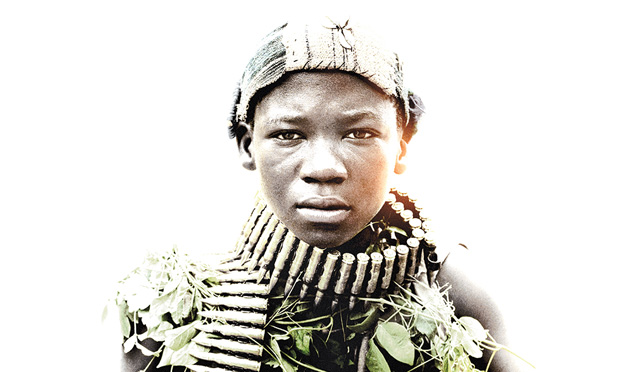Pat Bonner
 Cary Fukunaga’s Beasts of No Nation is equal parts brutal and beautiful. Written by Fukunaga and based on the novel by Uzodinma Iweala, the film’s set in an unnamed West African country in the midst of a civil war, and chronicles Agu (Abraham Attah) through his traumatic experience as a child soldier and his troubled relationship with the Commandant (Idris Elba). Fukunaga also shot the film, and like his Emmy-winning work on True Detective, he treats his subjects with extreme care and tenderness. The film’s filled with horrifying images, but the camera lingers on the gruesome only as long as Agu himself does; it’s as terrified as he is. This is not a violent film for violence’s sake, but a film about empathy, loss of innocence, and love in the face of horror. As with True Detective, Fukunaga is more concerned with the psychological effects of brutality. In the case of Beasts, these forces act upon children, and the result’s all the more harrowing.
Cary Fukunaga’s Beasts of No Nation is equal parts brutal and beautiful. Written by Fukunaga and based on the novel by Uzodinma Iweala, the film’s set in an unnamed West African country in the midst of a civil war, and chronicles Agu (Abraham Attah) through his traumatic experience as a child soldier and his troubled relationship with the Commandant (Idris Elba). Fukunaga also shot the film, and like his Emmy-winning work on True Detective, he treats his subjects with extreme care and tenderness. The film’s filled with horrifying images, but the camera lingers on the gruesome only as long as Agu himself does; it’s as terrified as he is. This is not a violent film for violence’s sake, but a film about empathy, loss of innocence, and love in the face of horror. As with True Detective, Fukunaga is more concerned with the psychological effects of brutality. In the case of Beasts, these forces act upon children, and the result’s all the more harrowing.
At the film’s outset, before his town is raided by militants in horrific fashion, Agu is nothing but lovely. One scene in particular shows Agu and his friends bartering with local law enforcement to buy their hollowed-out, “Imagination TV,” and it’s an absolute treat. He sings, he dances; he’s insightful, wily, and vulnerable. All of this makes it incredibly affecting when his life as he knows it gets ripped apart. Even after experiencing unspeakable horror, his giant heart stays in tact, and it’s partly what makes the film insanely beautiful. In describing the dead, Agu can’t help but remark on the sublime, referring to bloated bodies as being “plump like brown mangoes.”
Even the most troubling characters are treated with extreme care and nuance; Fukunaga refuses to cast judgement on anyone. As the leader of a troop of child soldiers, Elba’s Commandant is painted as a leader, a father figure, a person with his own vulnerabilities. Disturbing facts about the character eventually bubble to the surface, but Fukunaga isn’t interested in blatantly villainizing anyone. The characters’ actions speak for themselves. In fact, just before a horrific narrative bombshell gets dropped, the Commandant remarks astutely on the importance of empathy, telling Agu, “sometimes the best leader has to be knowing how to be a good follower.”
Don’t get me wrong, this is one of the most gut-and-heart-wrenching films I have ever seen, but all you have to do is read a synopsis to know that’s obvious. It’s a testament to both the acting and Fukunaga’s incredible direction/cinematography that a film with this kind of backdrop can end up pointing toward empathy and hope.
As a side note, I’ve seen a lot of thinkpieces about the snub of Beasts of No Nation and Idris Elba at the Oscars. It should have been nominated, and that would have been great, but no one could have realistically expected the racist voters of the Academy to actually recognize a film about Africa — either way, that’s not my point. Idris Elba is fine in the film, but the real revelation is Abraham Attah as Agu. He absolutely kills it for over two hours on screen. His range is unreal, going from a bubbly fun-loving kid to a depressed and traumatized child soldier. Idris Elba being snubbed is old news — he’s Stringer Bell for god’s sake. Give Abraham Attah all of the awards.
Pat Bonner is an artist, musician and filmmaker from Saint John and is currently Flourish Festival’s artist in residence.




